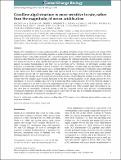Coralline algal structure is more sensitive to rate, rather than the magnitude, of ocean acidification
Abstract
Marine pCO2 enrichment via ocean acidification (OA), upwelling and release from carbon capture and storage (CCS) facilities is projected to have devastating impacts on marine biomineralisers and the services they provide. However, empirical studies using stable endpoint pCO2 concentrations find species exhibit variable biological and geochemical responses rather than the expected negative patterns. In addition, the carbonate chemistry of many marine systems is now being observed to be more variable than previously thought. To underpin more robust projections of future OA impacts on marine biomineralisers and their role in ecosystem service provision, we investigate coralline algal responses to realistically variable scenarios of marine pCO2 enrichment. Coralline algae are important in ecosystem function; providing habitats and nursery areas, hosting high biodiversity, stabilizing reef structures and contributing to the carbon cycle. Red coralline marine algae were exposed for 80 days to one of three pH treatments: (i) current pH (control); (ii) low pH (7.7) representing OA change; and (iii) an abrupt drop to low pH (7.7) representing the higher rates of pH change observed at natural vent systems, in areas of upwelling and during CCS releases. We demonstrate that red coralline algae respond differently to the rate and the magnitude of pH change induced by pCO2 enrichment. At low pH, coralline algae survived by increasing their calcification rates. However, when the change to low pH occurred at a fast rate we detected, using Raman spectroscopy, weaknesses in the calcite skeleton, with evidence of dissolution and molecular positional disorder. This suggests that, while coralline algae will continue to calcify, they may be structurally weakened, putting at risk the ecosystem services they provide. Notwithstanding evolutionary adaptation, the ability of coralline algae to cope with OA may thus be determined primarily by the rate, rather than magnitude, at which pCO2 enrichment occurs.
Citation
Kamenos , N A , Burdett , H , Aloisio , E , Findlay , H S , Martin , S , Longbone , C , Dunn , J , Widdicombe , S & Calosi , P 2013 , ' Coralline algal structure is more sensitive to rate, rather than the magnitude, of ocean acidification ' , Global Change Biology , vol. 19 , no. 12 , pp. 3621-3628 . https://doi.org/10.1111/gcb.12351
Publication
Global Change Biology
Status
Peer reviewed
ISSN
1354-1013Type
Journal article
Description
This work is supported by a Natural Environment Research Council PhD studentship (NE/H525303/1)Collections
Items in the St Andrews Research Repository are protected by copyright, with all rights reserved, unless otherwise indicated.

